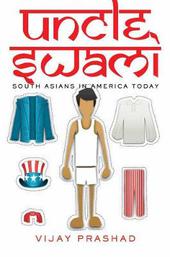
|
Uncle Swami: South Asians in America
Hardback
Main Details
| Title |
Uncle Swami: South Asians in America
|
| Authors and Contributors |
By (author) Vijay Prashad
|
| Physical Properties |
| Format:Hardback | | Pages:198 | | Dimensions(mm): Height 191,Width 133 |
|
| ISBN/Barcode |
9781595587848
|
| Classifications | Dewey:304.8089914073 |
|---|
| Audience | |
|---|
|
Publishing Details |
| Publisher |
The New Press
|
| Imprint |
The New Press
|
| Publication Date |
14 June 2012 |
| Publication Country |
United Kingdom
|
Description
Within hours of the attacks on the World Trade Center, misdirected assaults on Sikhs and other South Asians flared in communities across the nation, serving as harbingers of a more suspicious, less discerning, and increasingly fearful worldview that would drastically change ideas of belonging and acceptance in America. Weaving together distinct strands of recent South Asian immigration to the United States, Uncle Swami creates a rich discussion of a diverse and dynamic people whose identities are all too often lumped together and misunderstood.
Author Biography
Vijay Prashad is the George and Martha Kellner Chair in South Asian History at Trinity College in Hartford, Connecticut. He is the author of The Karma of Brown Folk and The Darker Nations (The New Press); the latter was chosen as a Best Nonfiction Book of the year by the Asian American Writers' Workshop and won the Muzaffar Ahmad Book Prize. He lives in Northampton, Massachusetts.
Reviews[Prashad] has set the standard by which future works on the Asian diaspora must be judged. Abraham Verghese, bestselling author of My Own Country and Cutting for Stone [Prashad's] scholarly analysis of the current Islamophobia is laced with great quotes from scholars and activists, including Gandhi on the limits of tradition and Tolstoy on feel-good liberalism (give to the poor but don't change anything). Like Prashad's prizewinning The Darker Nations (2008), this is bound to spark discussion as he juxtaposes the platitudes of multiculturalism, which celebrate the peoples and traditions of "other" lands (Africa, Asia, Latin America), against the unchanging truth that non-Western continues to be viewed as subordinate. Booklist
|